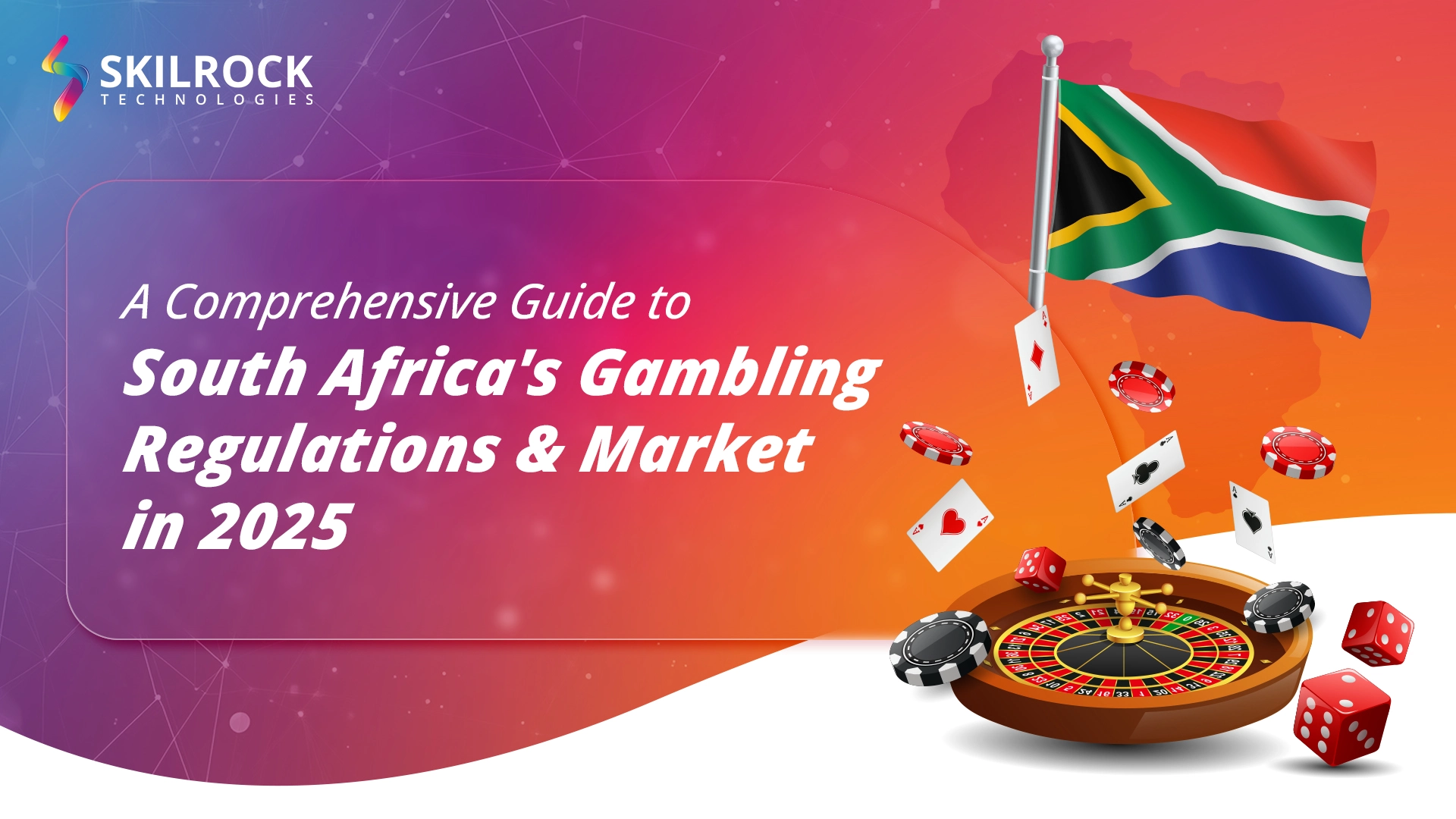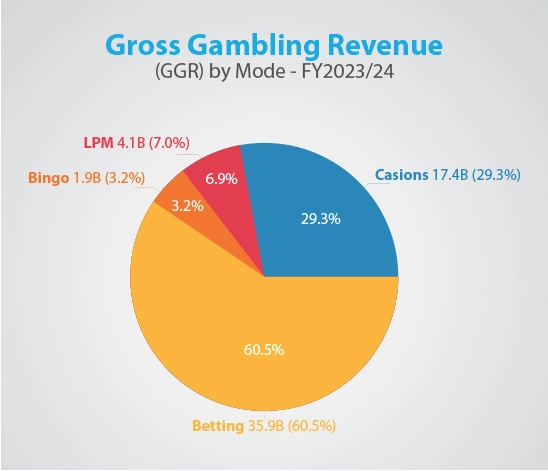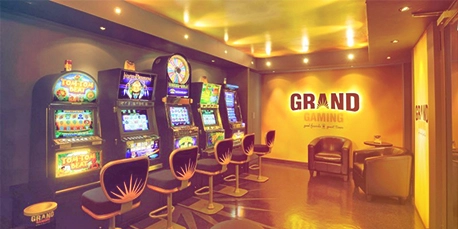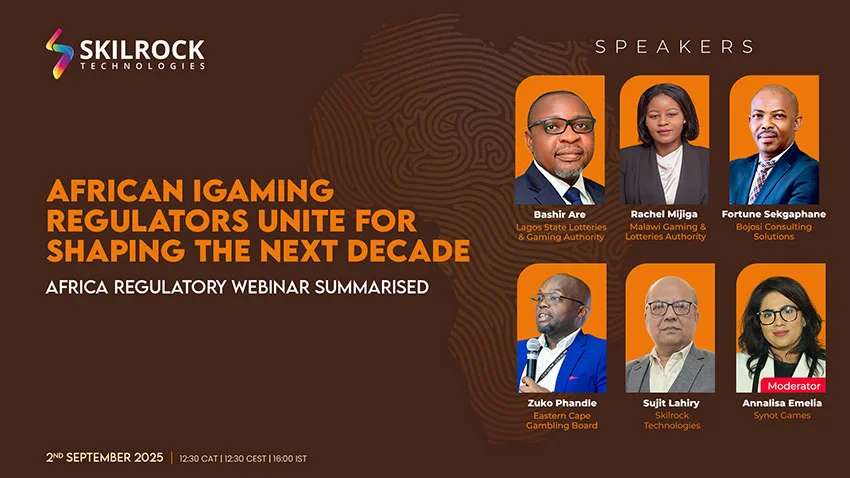A Comprehensive Guide to South Africa's Gambling Regulations & Market in 2025
As you explore the burgeoning world of online gambling in South Africa, understanding the regulatory landscape is crucial. This comprehensive guide will walk you through the process of obtaining an online gambling license in South Africa, shedding light on the regulatory framework and rules that govern this rapidly growing industry. Beyond the technicalities, you'll gain insights into the thriving lottery market in South Africa and the broader African continent, including projections for future growth. Discover how lottery revenues contribute to social causes both globally and within South Africa, demonstrating the positive impact of regulated gambling on communities. Whether you are an operator or simply curious about the industry, this guide offers valuable insights into South Africa's evolving gambling ecosystem.
Understanding South Africa's Gambling Regulatory Framework
South Africa's gambling industry operates under a comprehensive regulatory framework designed to ensure fair play, protect consumers, and contribute to the country's economic growth. The National Gambling Act of 2004 serves as the cornerstone of this framework, establishing the National Gambling Board (NGB) as the primary regulatory body.
Key Components of the Regulatory Framework
The NGB oversees all gambling activities, including casinos, sports betting, and lotteries. It works in conjunction with provincial licensing authorities to enforce regulations and issue licenses. This multi-tiered approach allows for both national consistency and provincial flexibility in gambling oversight.
Licensing Requirements
Obtaining a gambling license in South Africa involves a rigorous process. Applicants must demonstrate financial stability, technical competence, and a commitment to responsible gambling practices. The licensing procedure typically includes:
- Submission of a detailed business plan
- Background checks on key personnel
- Proof of sufficient capital
- Compliance with anti-money laundering regulations
Responsible Gambling Initiatives
South Africa places a strong emphasis on responsible gambling. Operators are required to implement measures such as self-exclusion programs, age verification systems, and problem gambling awareness campaigns. The National Responsible Gambling Programme, a public- private partnership, provides support and education to promote responsible gambling behavior.
Navigating the Process of Obtaining an Online Gambling License in South Africa
Understanding the Regulatory Framework
To operate an online gambling platform in South Africa, you must first grasp the country's regulatory landscape. The National Gambling Act of 2004 governs gambling activities, with the National Gambling Board overseeing the industry. While online casino gambling remains prohibited, sports betting and horse racing wagers are permitted through licensed operators.
Steps to Secure a License
- Choose your niche: Decide whether you'll focus on sports betting or horse racing or draw games.
- Prepare documentation: Gather financial records, business plans, and proof of technical competence.
- Submit application: Apply to the provincial gambling board where you intend to base your operations.
- Undergo vetting: Expect thorough background checks and financial audits.
- Comply with requirements: Implement responsible gambling measures and anti- money laundering protocols.
Navigating Challenges
Obtaining a license can be a complex process. Be prepared for potential hurdles such as lengthy processing times and stringent compliance requirements. It's advisable to seek legal counsel familiar with South African gambling laws to guide you through the intricacies of the application process.
The Lucrative South African Lottery Market and Its Growing Potential
South Africa's lottery market is a thriving sector within the country's gambling industry, offering significant opportunities for growth and investment. With a population of over 59 million people, the Rainbow Nation boasts a diverse and enthusiastic player base eager to try their luck.
Gambling Sector Performance in Financial Year 2023/24
At the end of FY2023/24, Gross gambling revenue (GGR) amounted to R59.3 billion, a 25.7% increase from the previous year. Analysis of GGR by gambling mode revealed betting to have generated 60.5% of industry GGR at R35.9 billion. Casinos also generated a sizable proportion of GGR at R17.4 billion (29.3%). The LPM industry is the third largest sector (7.0%), generating R4.1 billion during FY2023/24. The bingo industry generated 3.2% of revenues at R1.9 billion.
Top Areas for Gambling in South Africa
South Africa consists of nine provinces, each contributing uniquely to the country's gaming industry. As of the end of the 2023/24 financial year, the Western Cape leads with a 31.7% market share, followed by Gauteng, the most populous province, at 22.1%, and Mpumalanga closely behind at 21.9%.
The industry remains vibrant, with 37 operational casinos, 549 bookmaker outlets, and 15,805 active Limited Payout Machines (LPMs) spread across the provinces as of Q4 FY2023/24. These numbers highlight the dynamic nature of South Africa’s gaming market and its ongoing growth.
Market Size and Growth Projections
The South African lottery market has experienced steady growth in recent years, with annual revenues reaching billions of rand. Industry experts project continued expansion, driven by factors such as increasing disposable income, technological advancements, and a growing middle class. As online and mobile platforms become more prevalent, the accessibility of lottery games is expected to further fuel market growth.
Player Demographics and Preferences
South African lottery players come from various socioeconomic backgrounds, with a particularly strong following among the working and middle classes. The most popular game types are draw based which offer the allure of life-changing jackpots, while scratch cards and instant win games provide immediate gratification for those seeking quick thrills. Popular games include Lotto, PowerBall, and Daily Lotto, each offering unique prize structures and drawing frequencies.
Impact on Social Causes
One of the most significant aspects of South Africa's lottery market is its contribution to social causes. A substantial portion of lottery revenues is allocated to the National Lotteries Distribution Trust Fund, which supports various charitable organizations and community development projects. This model of "gaming for good" has helped fund initiatives in education, healthcare, sports, and the arts, demonstrating the positive impact of regulated gambling on society.
Top Operator in South Africa
-
ITHUBA Holdings, a powerhouse in Africa’s lottery industry, has seen nearly a decade of continuous growth, consistently setting new benchmarks in South Africa’s national lottery sector. As part of its strategic expansion, ITHUBA has successfully secured licenses to operate and develop national lotteries across southern Africa.
In 2023, the company led the launch of the National Lottery of Uganda, marking a significant milestone in its regional growth. With further expansions into Tanzania and Botswana on the horizon, ITHUBA continues to strengthen its presence as a leading force in Africa’s lottery market.
-
Tsogo Sun: A prominent entertainment company in South Africa, Tsogo Sun operates 15 casinos, 24 Galaxy Bingo sites, and a network of Limited Payout Machines (LPMs) across nine provinces. Their portfolio includes renowned establishments such as Montecasino, Suncoast Casino, and Gold Reef City Casino.
-
Sun International: Founded by Sol Kerzner, Sun International is a major player in South Africa's gaming and hospitality sector. The company owns 42.5% of the South African casino market and holds significant interests in 11 out of 38 operating casinos in the country. Notable properties include the Sun
How Lottery Taxes Benefit Social Causes in South Africa and Beyond
Funding Social Initiatives in South Africa
Lottery taxes in South Africa play a crucial role in supporting various social causes. The National Lotteries Commission (NLC) allocates a significant portion of lottery revenue to fund projects in arts, culture, heritage, charities, and sports. These funds have helped build schools, support healthcare initiatives, and promote cultural preservation efforts across the country.
Transparency and Accountability
To ensure that lottery taxes are used effectively, South Africa has implemented strict oversight measures. The NLC regularly publishes reports detailing fund allocation and project outcomes, promoting transparency and accountability in the use of lottery- generated revenue for social causes.
Future Outlook
As the African gambling market continues to grow, the potential for lottery taxes to fund social initiatives is expected to increase. This trend could lead to more significant investments in education, healthcare, and community development projects across the continent, further amplifying the positive impact of lottery taxes on society.
The Future of Online Gambling and Lottery in the African Market
Rapid Growth and Potential
The African online gambling and lottery market is poised for explosive growth. With a young, tech-savvy population and increasing internet penetration, countries like South Africa are leading the charge. Experts predict the continent's gambling industry could reach $37 billion by 2025, with online platforms capturing a significant share.
Technological Advancements
Mobile technology is driving this expansion. Smartphone adoption rates are skyrocketing across Africa, providing easy access to online gambling and lottery platforms. Operators are investing in user-friendly apps and mobile-optimized websites to capitalize on this trend.
Regulatory Challenges and Opportunities
As the market grows, so does the need for comprehensive regulations. South Africa's progressive approach to online gambling licensing could serve as a model for other African nations. Clear regulations not only protect players but also attract reputable international operators, further stimulating market growth.
Social Impact and Responsible Gaming
The future of African online gambling isn't just about profits. Many countries, including South Africa, are leveraging lottery revenues to fund social causes. As the industry expands, there's potential for even greater positive impact. However, stakeholders must prioritize responsible gaming initiatives to ensure sustainable growth and protect vulnerable populations.
Frequently Asked Questions
Q 1. What are the legal forms of gambling in South Africa?
The National Gambling Act (NGA) regulates gambling activities in South Africa, permitting only specific types of gambling. These include:
- Casinos – Physical establishments with real machines and gambling tables (not online or computer-based).
- Bingo – Traditional bingo halls and electronic bingo terminals.
- Betting – Wagering on sports and horse racing through licensed bookmakers.
- Limited Payout Machines (LPMs) – Low-stakes gaming machines typically found in pubs, restaurants, and similar venues.
These activities are only legal if operated by a gambling provider licensed by a Provincial Gambling Board. Additionally, players must be 18 years or older to participate.
Q 2. Is online gambling legal in South Africa?
No, online casino-style gambling is illegal in South Africa. According to Section 11 of the National Gambling Act, interactive gaming is prohibited unless explicitly authorized by national law. However, online sports betting and horse race betting are legal if offered by bookmakers licensed in South Africa.
Q 3. Can South Africans gamble with international operators?
No, gambling with overseas operators is illegal under South African law.
Q 4. How to apply for a gambling license in South Africa?
A gambling license must be obtained from the relevant Provincial Licensing Authority (PLA). Applications are processed based on regulatory requirements set by each province.
Q 5. What modes of Gambling are Not legal in South Africa ?
The following are illegal:
- Any form of underage gambling (children under 18 are not permitted to gamble);
- Unlicensed casinos or bingo establishments and card/dice games in a private establishment or residence;
- Online gambling of all kinds for money (gambling games that take place on the screen) en any kind of electronic device including mobile phones;
- Gambling games on a website for money or online gambling games offered by an internet cafe
- Any gambling/gaming that takes place on the street or In a park for money (fafee/ MoChina or similar); and
- Any betting activity involving animals e.g. deg racing. dog or cockerel fighting and illegal horse racing.
Conclusion
As you navigate South Africa's online gambling landscape, obtaining the proper license is crucial for operating legally and ethically. The regulatory framework, while complex, ensures a fair and safe environment for both operators and players. With the African market poised for significant growth, particularly in the lottery sector, opportunities abound for responsible businesses. Remember that beyond profits, lotteries contribute substantially to social causes in South Africa and globally. By adhering to regulations and embracing corporate social responsibility, you can position your online gambling venture for success while making a positive impact on communities. Stay informed, comply with regulations, and be part of the exciting future of online gambling in South Africa.


 English
English

 Spanish
Spanish
 Portuguese
Portuguese













